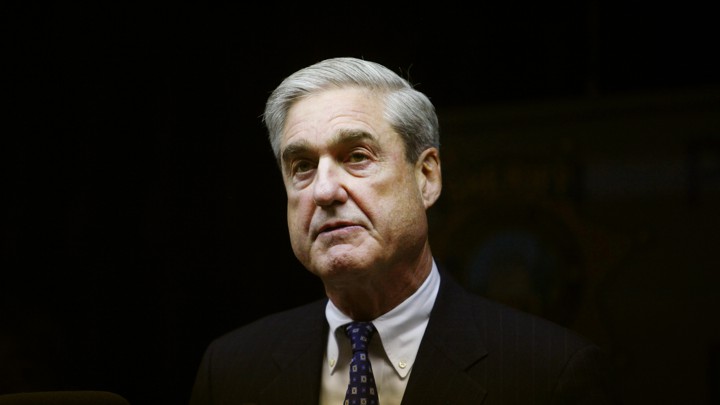David Frum pulled his broken-clock routine and said something worth reading for the first time in 8-10 months.
Mueller Helped Trump Keep His Most Important Secrets
The central question about the Trump-Russia matter remains unanswered.
APR 19, 2019
David Frum
Staff writer at
The Atlantic
ERIC THAYER / REUTERS
Special Counsel Robert Mueller’s report has settled—or all but settled—important questions about the Trump-Russia matter.
Did Russia intervene in the 2016 election with the conscious and articulated intent to help elect Donald Trump? Yes.
How important were these interventions to the outcome? Large, possibly decisive.
Did the Trump campaign know that Russia was doing the intervening? From the beginning, cybersecurity experts said Russian hackers had obtained leaked Democratic emails. The Mueller report decisively refutes Julian Assange’s alternative explanation—the lie that WikiLeaks had an “inside source.”
Did the Trump campaign know of these interventions in advance? Uncertain. Mueller reports that people in and around the Trump campaign frantically sought advance information about WikiLeaks, but the evidence about whether they succeeded has been redacted to protect an ongoing legal matter.
Did the Trump campaign welcome Russian interventions? Yes.
Did the Trump campaign assist these interventions? Not as a corporate entity, no, but its campaign manager did for his own business reasons.
Did the Trump campaign commit any crimes along the way? While many of the elements of crime were present, the relevant players—especially Donald Trump Jr.—were arguably too feeble-minded to meet a courtroom test of criminal intent. Paul Manafort and Roger Stone aside, the Mueller report assesses the senior figures in the Trump campaign as credulous dupes of Russian spy agencies, not as partners and co-conspirators.
It’s welcome to have all these matters settled, after the Trump team and its media surrogates denied any such intrigue so vociferously and for so long.
But it is disturbing that, even now, the most important question about the Trump-Russia matter remains unanswered:
Why?
Why did the Russians do it? Just think of the risk they incurred in 2016. Vladimir Putin can presumably read a poll as well as anybody else. He had to worry that Hillary Clinton would win despite his interventions and then exact some kind of retribution during her presidency. Putin must have expected some very big payoff. What was it?
The Mueller investigation reportedly obtained important Trump financial documents that might shed light on this vital question. Whatever insight was gained from those reports, however, has apparently been held secret.
From the time Trump declared for president, he has been surrounded by rumors of corrupt financial dealings, especially with Russians. Trump has refused the financial disclosures that would assure Americans those rumors are unfounded. He would not release tax returns. He withheld relevant business information about his companies, which, in all but the narrowest of senses, he continued to control.
To date, Trump’s political party in Congress has protected him from scrutiny, as if the integrity of the presidency were purely a personal concern of the president’s.
Public-spirited Americans were sustained by one hope: Mueller was investigating. Sooner or later, the special counsel would tell them the truth. Was their president financially beholden to Russian sources or not?
But no!
Mueller, too, has treated the president’s finances as a matter appropriately secret—as none of the public’s business. It wasn’t Attorney General William Barr who redacted Trump’s pre-2016 business history out of the Mueller report. That was the authors’ own decision, based on their interpretation of their job as a criminal inquiry, not a national-security investigation.
If it’s not a crime, it’s not addressed in the published portion of the Mueller report. And of course, doing business with foreign oligarchs would not in itself be a crime.
So here we are, with most of the report released at last, and the biggest questions about Trump continue as unanswered as ever. This is bad news for Trump’s defenders, too, because Trump’s reputation will continue to suffer from the uncertainty. After all, the president has already been caught in one huge network of lies about the Trump Tower Moscow project, which he pursued through June 2016, only to insist the following month that he had “nothing to do with Russia.” That suggests that his other denials are equally dubious.
But who knows? Maybe he lied only about the one project and otherwise told the truth. Mueller neither vindicates him nor accuses him. He accepts instead that the whole vast question of the president’s financial obligations to Russia should be kept confidential.
This acceptance puts mighty responsibility on Republicans in Congress. By now, they have sadly proved unworthy of that responsibility. They enable concealment even of the most obviously relevant national-security information. There is little reason to hope that will change between now and November 2020. Worse, the more politically vulnerable Trump looks, the harder his party works to protect him.
And so, after all of Mueller’s hard work, the American people remain as unsure as ever about their president’s fundamental loyalty to this country. Mueller has joined with Trump to shove deeper into the shadows any answer to the most haunting question of the Trump era:
What does the president owe, and to whom does he owe it?


